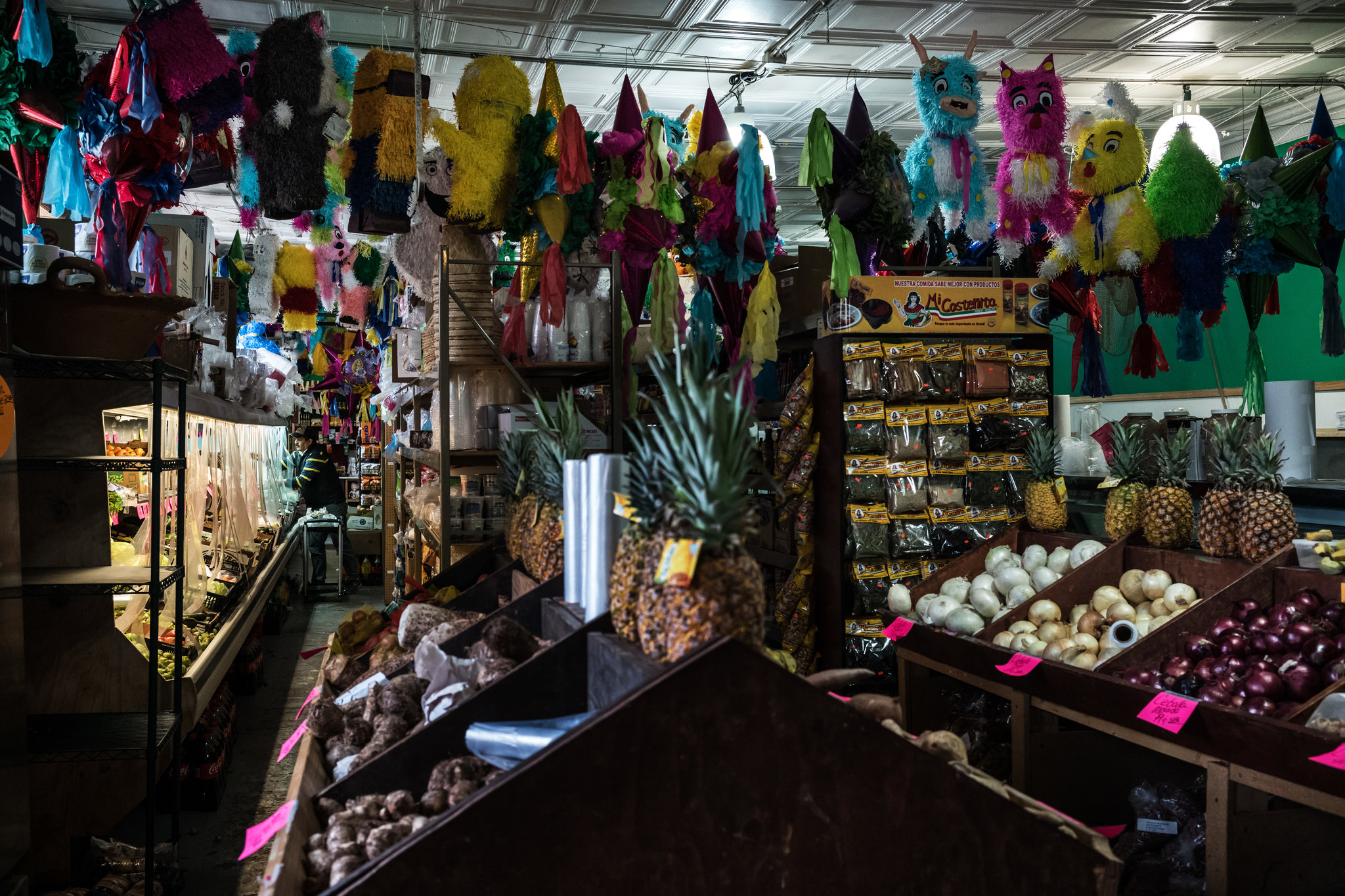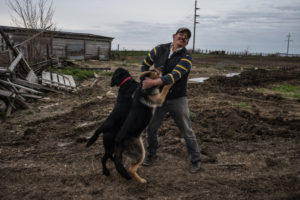NY Times: Immigrants Keep an Iowa Meatpacking Town Alive and Growing

Sunrise in Storm Lake, a town of about 11,000 people in northwest Iowa. Credit Todd Heisler/The New York Times
By PATRICIA COHEN MAY 29, 2017
Waves of Asian, African and Latino newcomers have filled jobs at pork, egg and turkey plants where wages have fallen and work has grown more grueling.
STORM LAKE, Iowa — When Dan Smith first went to work at the pork processing plant in Storm Lake in 1980, pretty much the only way to nab that kind of union job was to have a father, an uncle or a brother already there. The pay, he recalled, was $16 an hour, with benefits — enough to own a home, a couple of cars, a camper and a boat, while your wife stayed home with the children.
“It was the best-paying job you could get, 100 percent, if you were unskilled,” said Mr. Smith, now 66, who followed his father through the plant gates.
After nearly four decades at the plant, most of them as a forklift driver, Mr. Smith is retiring this month.

Dan Smith, center, with Tammy Heflin, a co-worker from Tyson Foods. In his 37 years at the meatpacking plant in Storm Lake, it has changed dramatically. Credit Todd Heisler/The New York Times
The union is long gone, and so are most of the white faces of men who once labored in the broiling heat of the killing floor and the icy chill of the production lines. What hasn’t changed much is Mr. Smith’s hourly wage, which is still about $16 an hour, the same as when he started 37 years ago. Had his wages kept up with inflation, he would be earning about $47 an hour.
The forces that have helped transform this snug lakeside town in northwestern Iowa and others like it during Mr. Smith’s working life have created a complex swirl of economic successes and hardships, optimism and unease.
Fierce global competition, agricultural automation and plant closures have left many rural towns struggling for survival. In areas stripped of the farm and union jobs that paid middle-class wages and tempted the next generation to stay put and raise a family, young people are more likely to move on to college or urban centers like Des Moines. Left behind are an aging population, abandoned storefronts and shrinking economic prospects.
Yet Storm Lake, hustled along by the relentless drive of manufacturers to cut labor costs and by the town’s grit to survive, is still growing. However clumsily at times, this four-square-mile patch has absorbed successive waves of immigrants and refugees — from Asia, from Mexico and Central America, and from Africa.
They fill most of the grueling, low-paid jobs at the pork, egg and turkey plants; they spend money at local shops, and open restaurants and grocery stores; they fill church pews and home-team benches. While more than 88 percent of the state’s population is non-Hispanic white, less than half of Storm Lake’s is. Walk through the halls of the public schools and you can hear as many as 18 languages.

Members of the Storm Lake High School varsity soccer team standing for the national anthem. Credit Todd Heisler/The New York Times

Students getting ready to cook at the high school’s student-run restaurant. Credit Todd Heisler/The New York Times
But if the newcomers have brought some of the economic dynamism that President Trump promised to restore to the struggling Midwest and South, they have also fed some of the anxieties and resentments that he stirred.
Steve King, the Republican congressman for this predominantly white, conservative district, blames immigrants and refugees for pushing down wages, bringing unwelcome cultural diversity and burdening public services.
While Mr. King’s nativist comments have been labeled racist by critics, his fervent animosity to immigration has done little over the years to dent his electoral popularity in most of the 39 counties he represents.
Storm Lake, with a population of roughly 11,000, is in no way immune to the strains and tensions that an influx of poor, low-skilled and non-English-speaking immigrants and refugees can bring. But after decades of living and working together, the residents recognize that their future is a shared one.
“Other communities our size are shrinking and consolidating school districts,” said Mark Prosser, the police chief. “We have schools bulging at the seams. There are expensive challenges, but which one do you want: a dying community or one that has growth?”
Less than a half-mile from the police station, the shelves at Valentina’s Meat Market offer a still-life version of the town’s inhabitants. A kaleidoscope of packages, jars and produce from nearly every continent is jammed in — side by side are purple yams from Laos, green plantains from Ecuador, mahogany-brown cassava from Nigeria, tan egg roll wrappers from Vietnam.
Silvino Morelos, the Mexican-born owner, has lived in Storm Lake for more than 20 years. He came after his grocery business in Los Angeles was looted and burned during the racially charged 1992 riots that followed the acquittal of four white police officers accused of beating a black motorist, Rodney King. Here, he said, he has always felt welcome and secure.
“A lot of different communities are living together,” said Mr. Morelos, who aims to feed them all.

Produce at Silvino Morelos’s store, Valentina’s Meat Market, which stocks items reflecting the various immigrant groups in town. Credit Todd Heisler/The New York Times
His wife, Mayela, works from 5 a.m. to 2 p.m. at the pork plant, earning $18 an hour, before handling the register at Valentina’s until the early evening. Mr. Morelos often doesn’t finish up before midnight, he said, and rarely takes a day off. He recently bought a 22-acre farm about five minutes outside of town where he is raising lambs and goats. Dedicated workers, he said, can live “a good life.”

Behind the butcher counter, Mr. Morelos keeps a shrine to people from the community who were close to him and have died. Credit Todd Heisler/The New York Times

Mr. Morelos is greeted by his dogs at the farm he recently bought on the outskirts of town. Credit Todd Heisler/The New York Times
‘Just Trying to Make a Buck’
Shared ambitions and a willingness to work hard command respect across cultures here.
Mr. Smith, looking back on his decades at the plant, acknowledges that a supply of immigrants makes it easier for employers to pay less, but he doesn’t begrudge them the work.
“I harbor no ill feelings for anybody who’s trying to make a better life for themselves,” he said, settling on the living room couch in his home, a corner house next to the railroad tracks, which he shares with his girlfriend. “They’re just trying to make a buck for their family, like I am.”
Mr. Smith remembers that it wasn’t the arrival of foreign workers that initially drove down wages, but the plant owners.
First was Hygrade Food Products Corporation, an old-style meatpacking house that introduced Ball Park Franks to the Detroit Tigers’ stadium in 1957 and operated the Storm Lake plant when Mr. Smith went to work there. Faced with competition from new companies that had developed a faster, more efficient method of boxing beef and selling it to supermarket chains and fast-food outlets, Hygrade in 1981 asked its workers to take a pay cut of $3 an hour. When they refused, the plant closed.
With vigorous support from town leaders, the upstart Iowa Beef Processors (later known as IBP) bought and reopened it a few months later — slashing wages by more than half and shunning the union.
At that point, Mr. Smith returned to do night cleanup, earning $5.50 an hour with no benefits, but a vast majority of his former co-workers were turned away, he said, because the new owner did not want to hire union supporters. Instead, the company began actively recruiting in Mexico and in immigrant communities in Texas and California.
“They learned real fast to keep a sharp knife and didn’t complain if they had a sore arm,” Mr. Smith said.
The new form of meatpacking that sprang up in Iowa and the Midwest transformed the industry. “There was lower pay, faster lines and higher injury rates,” said David Swenson, a regional scientist in the economics department at Iowa State University.
Tyson Foods bought IBP in 2001, and its red oval logo greets visitors as they drive into town. Tacked onto the entry gate, a large banner announces, “New starting pay” — $15 an hour on the production line.
Even at that level, more than twice the state’s $7.25 minimum wage, workers can be hard to come by. Standing in the same spot for eight hours or more at a time, in near-freezing temperatures, slashing at carcasses that swing by at a fast pace, can numb body and soul. The poultry industry also ranks among the most dangerous in the United States, according to a new report by the National Employment Law Project.
CLICK HERE to continue reading.
